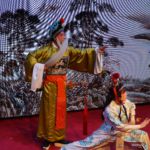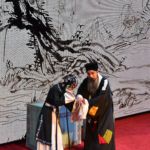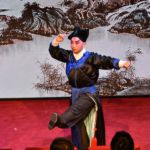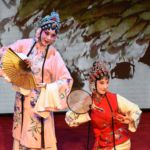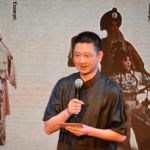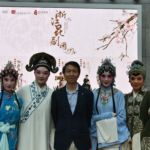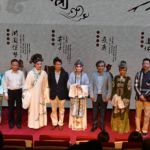Chinese Opera: Kunju performances by the Zhejiang Kunju Troupe
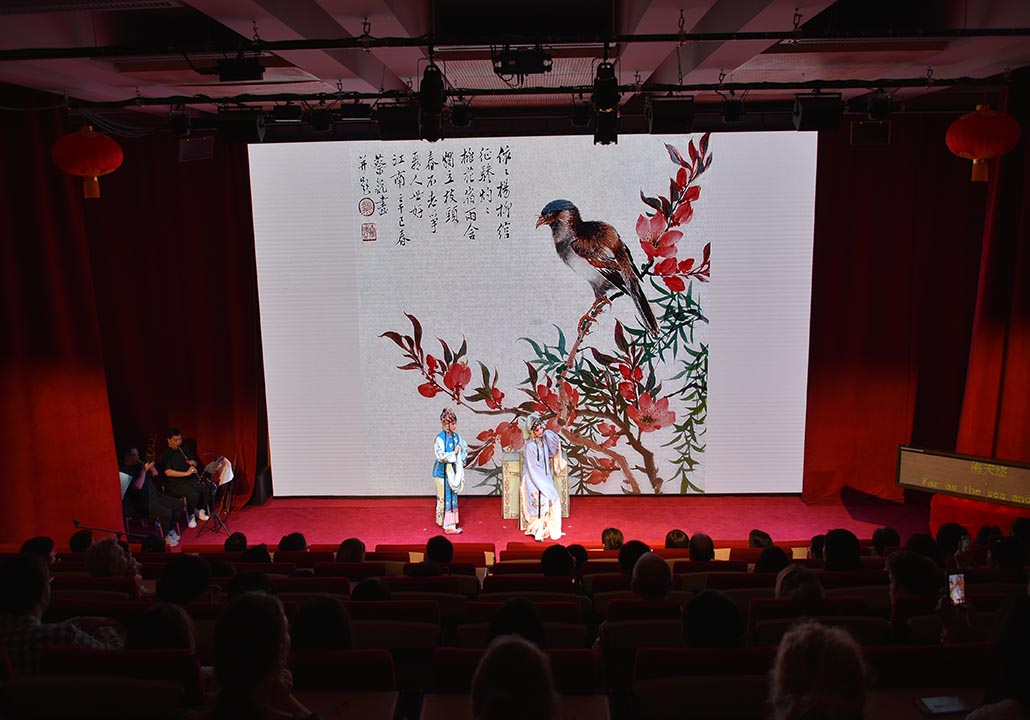
On June 14 th and June 15 th, the China Cultural Center in Brussels had the honor to host the famous Zhejiang Kunju Troupe, the oldest professional Kunju troupe in China, in the framework of the “Week of China Intangible Cultural Heritage”. This themed-week also allowed visitors to enjoy two special screening evenings, featuring two mouth-watering episodes of the documentary series “A Bite of China” on Monday 12th and Tuesday13 th.
During the Kunju performances on Wednesday and Thursday, more than 200 spectators (re)discovered this traditional art of Chinese Opera, an art form that is listed in the UNESCO’s Representative List of the Oral and Intangible Cultural Heritage of Humanity. On Wednesday evening, the most famous drama of literary master Tang Xianzu, The Peony Pavilion, completely charmed the visitors with its dramatic tunes and its very colorful characters. On Thursday, the spectators were brought on a journey through China’s most popular operas, with Mr. Wang Mingqiang, Vice-President of the Zhejiang Kunju Troupe, and the talented actors and artists of the troupe.
Having made great strides in popularizing and expanding the Kunju art, the Zhejiang Kunju Troupe has enjoyed some recognition abroad since the 2000. It was in front of a crowded audience that the troupe conducted its two performances at the China Cultural Center in Brussels. Minister-Counsellor Li Jianmin, from the Mission of the People’s Republic of China to the EU, and Counsellor Xiang Shihai, from the Embassy of the People’s Republic of China to Belgium, also attended the show on Wednesday.
The evening of Wednesday, June 14, was placed under the poetic sign of the dream with the representation by the troupe of The Peony Pavilion, the romantic masterpiece of Chinese literary master and playwright, Tang Xianzu. The visitors were first welcomed in the lobby by enchanting tunes performed by several musicians and two typical characters of Kunju opera standing by them. A perfect introduction to the rest of the evening, and also a must-have opportunity to take pictures and record videos of those rare moments.
The crowd then proceeded to the main auditorium, to witness a moment of poetry and traditional arts, with three scenes from the Peony Pavilion, depicting the impossible love story between Du Liniang, a government official’s daughter, and Liu Mengmei, a scholar, with whom she fell in love in a dream. With very minimal props but precise and meticulous gestures and movements, the actors succeeded to captivate the audience and moved everyone with their romantic story. A subtitle installation enabled the audience to follow the intriguing story and the dialogues between the actors, which made the experience even more enjoyable!
“I think I will come back tomorrow !” said one of the enthusiastic spectator after the show. “I really want to enjoy those rare performances once again!”, he continued. Indeed, even if the evening of Thursday was structured in another way, it still attracted the public’s attention and the room was once again fully booked. Minister-Counsellor Chen Dong, Counsellor Tao Hongjian from the Embassy of the People’s Republic of China, as well as Minister-Counsellor Li Jianmin from the Mission of the People’s Republic of China to EU and his colleague, Counsellor He Yonghong, also attended Thursday’s event
Led by Mr. WANG Mingqiang, art director and renowned professor, Vice-president of the Zhejiang Kunju Troupe, who gave valuable information about the different excerpts, the actors and artists of the troupe demonstrated the full range of their talent in performing different excerpts from four of the greatest Chinese operas: “The Peony Pavilion”, “The Tale of the Sword”, “Lanke Mountain”, and “The Story of Washing Gauze”, the very first Chinese opera to be written – as kunju opera was originally transmitted orally. Through these popular classics, the spectators discovered the sumptuousness of traditional Chinese Opera, rich in a variety of styles and elegant scenarios. The actors were not only talented, but also very kind and generous as they made themselves available for souvenir pictures at the end of the show.
Successful combination of singing, dance, narration and theatrical plays, Kunju remains a complete artistic discipline, which succeeds in crossing ages and generations. Being one of the most ancient forms of drama together with ancient Greek tragedy and Indian sanskrit drama, Kunju is the only one to be still produced on stage those days among those three disciplines.
It is in this aspect that the greatest ambition of the Zhejiang Kunju Troupe resides: to develop new ideas and innovative approaches in the constant dedication to the preservation, protection, development and passing down of Chinese Kunju tradition, a heritage of more than 600 years!

